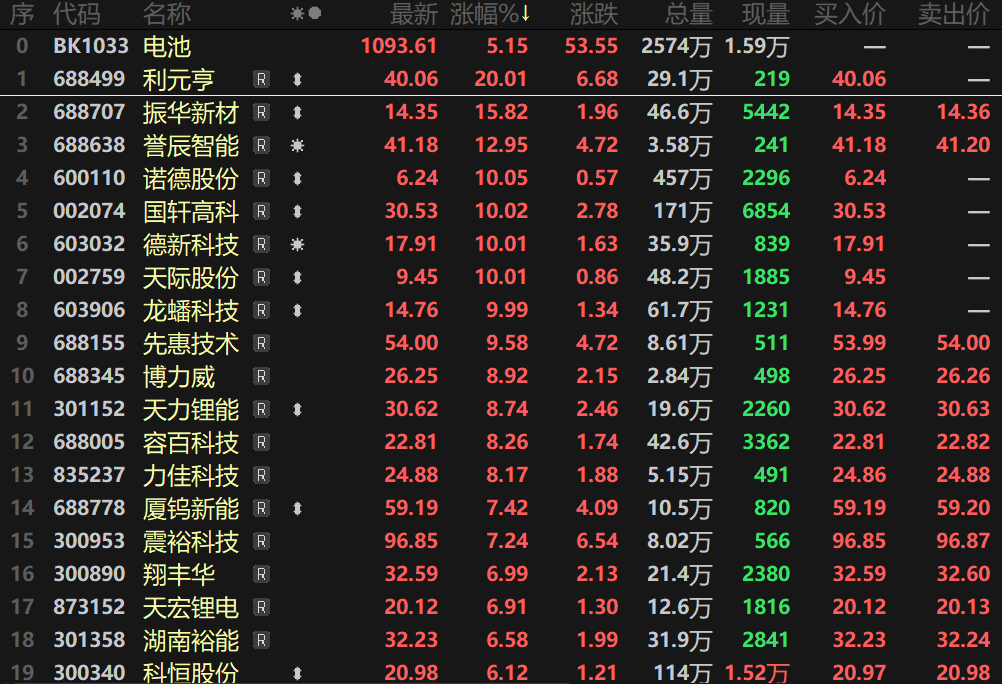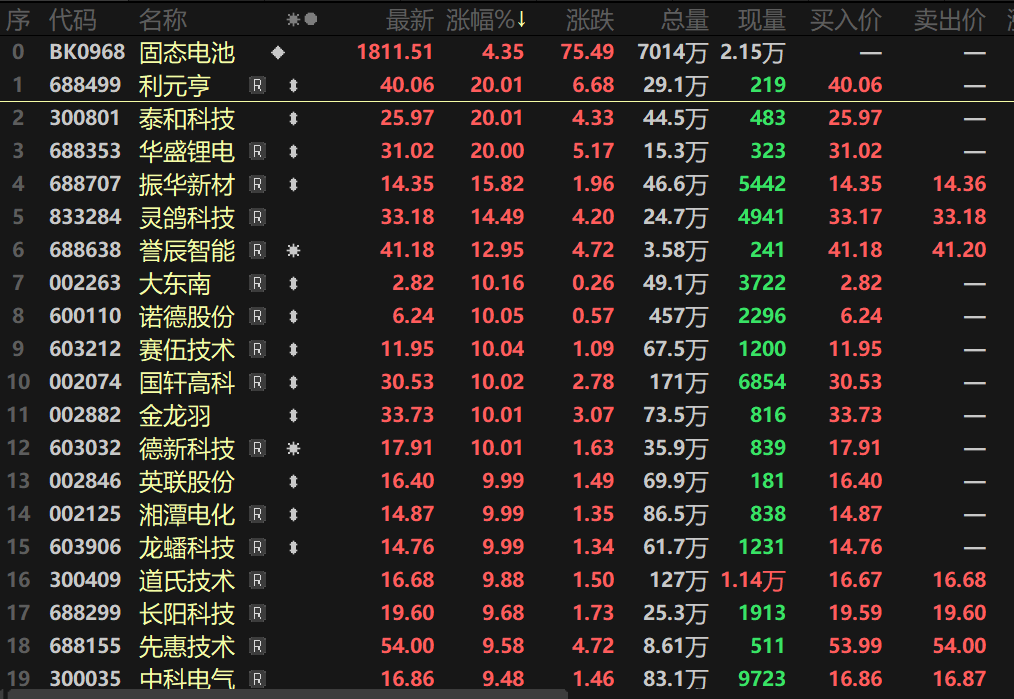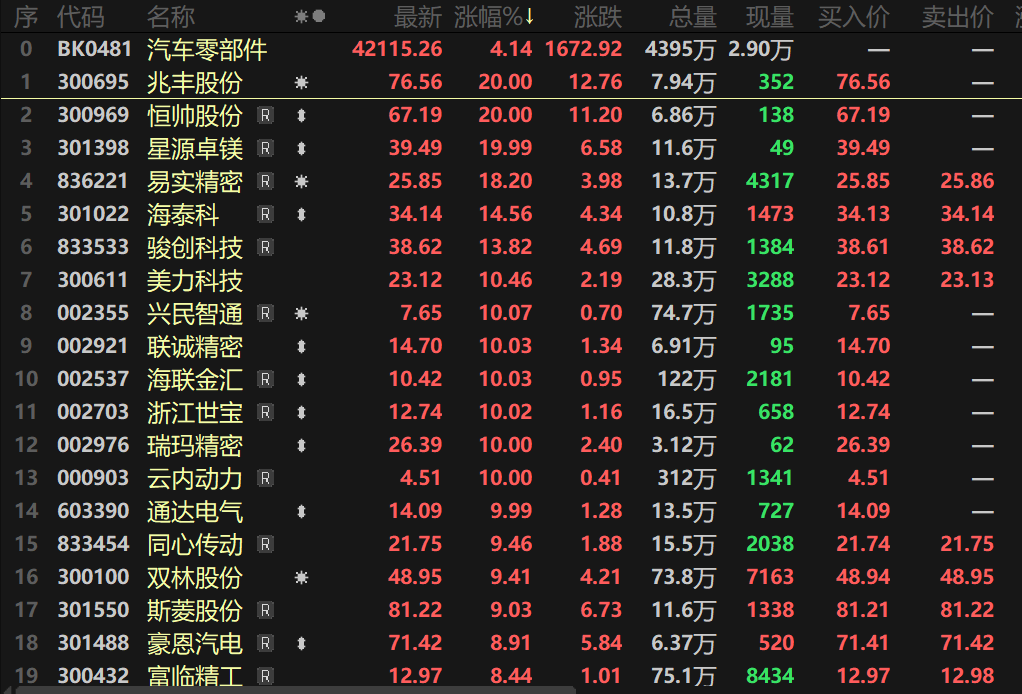SMM News on June 24: Today, the battery and auto parts sectors saw a simultaneous rise during trading. The battery index surged by over 5.4% at one point. Among individual stocks, six, including Lyric, Nord Holding, Gotion High-tech, and Lopal, hit the daily limit. Many others, such as Bolive, Tianli Lithium Energy, and Ronbay Technology, also surged by over 8%.

Notably, the solid-state battery sector, which has been hot recently, continued to shine. The index closed up 4.35%, reaching 1813.22 at one point during trading, a new high since February 2023. Among individual stocks, Lyric, Taihe Technology, and Huasheng Lithium Battery hit the 20CM daily limit, while nine others, including Dadongnan, Jinlongyu, and Xiangtan Electrochemical, also hit the daily limit.

The auto parts index rose by over 4%, with individual stocks experiencing a small-scale surge in daily limits. Nearly 10 stocks, including Zhaofeng, Hengshuai, Xingyuan Zhuomei, Yunnei Power, Zhejiang Shibao, and Liancheng Precision, hit the daily limit, while Tongxin Transmission, Shuanglin, and others followed suit with gains.

On the news front, in the solid-state battery sector, several companies have recently disclosed their latest progress and mass production timelines in the field of solid-state batteries, with frequent catalysts for the sector. US startup Ion Storage Systems has commenced solid-state battery production, expected to bring breakthroughs in smartphones and EVs. Gotion High-tech previously announced a strategic cooperation with EHang. Building on their initial collaboration, the two parties will focus on upgrading the power systems of EHang's flagship EH216-series autonomous electric vertical takeoff and landing aircraft (eVTOL), and plan to deepen collaboration in multiple aircraft models in the future to promote the high-quality development of the low-altitude economy industry. In addition, Gotion High-tech also stated that the Jinshi all-solid-state battery PACK system has completed preliminary development and application work and has begun on-vehicle road testing.
Furthermore, China Securities also noted that Qingtao has received environmental assessment approval opinions for its 15GWh solid-state battery project in the Chengdu base. Companies such as SAIC, BMW, and Changan have proposed vehicle installation or road test plans, indicating that the industry is poised for takeoff.
Some analysts believe that with active guidance from industrial policies and incremental demand from emerging industries such as the low-altitude economy and embodied intelligence, the solid-state battery industry is expected to maintain a rapid development trend. Some institutions even predict that global solid-state battery shipments will reach 614.1GWh by 2030, with a market size exceeding 250 billion yuan.
Huaxi Securities commented that the upgrading and iteration of battery technology is the core driving force behind the expansion of end-use demand. With advantages such as high energy density and high safety, solid-state batteries have become the definite next-generation battery technology direction. As battery technology continues to mature and the supporting industry chain improves, new solid-state battery-related products are expected to be launched successively, and capacity construction will also continue to be implemented. It is expected that the industrialisation process of solid-state batteries will accelerate.
In terms of automotive parts, Tesla recently officially launched its Robotaxi (autonomous taxi) service in Austin, Texas, US. Around 10 Model Y vehicles were put into use as the first batch of autonomous taxis, beginning to transport the first group of passengers.
In addition, domestically, on June 23, "Zaofu Intelligent Technology Co., Ltd.", jointly initiated by Hello, Ant Group, and CATL through their respective investment entities, was officially registered. The three parties will collaborate on the R&D of Level 4 autonomous driving technology based on their respective technological and resource advantages, continuously improving technological safety, and promoting commercial applications and ecosystem construction.
According to a research report by TF Securities, 2025 may mark the first year of autonomous taxis. It is expected that the autonomous taxi market will grow rapidly starting from 2027, reaching a scale of nearly 500 billion yuan by 2030, 22 times that of 2027, with a penetration rate of 32% in smart mobility.
Furthermore, there is another positive development for NEVs today. The Ministry of Commerce issued a notice on organizing the 2025 NEV Consumption Season activities in thousands of counties and towns across the country, coordinating key tasks such as the trade-in policy for vehicles, pilot reforms in automobile circulation and consumption, and the "Shop in China" series of activities. It will leverage the roles of local governments, industry associations, and enterprises, adhering to a dual-driven approach of "policies + activities" to strengthen the supply-demand matching of NEVs, launch new products, promote the improvement of the NEV purchase and use environment in counties and townships, and facilitate the penetration of NEVs into rural areas. The activity will take place from July to December 2025. 》Click for details
It is also worth mentioning that previously, multiple regions across the country had successively issued announcements stating that they would suspend or adjust the acceptance of applications for vehicle replacement subsidies, leading to market speculation about a "subsidy cutoff". In response, the National Development and Reform Commission (NDRC), the Ministry of Finance, and other ministries and commissions recently stated that the national subsidy policy for the trade-in of consumer goods in 2025 will be implemented as originally planned until December 31, with the remaining 138 billion yuan in central funds to be disbursed in batches during Q3 and Q4. The "subsidy suspension" in some regions is actually a normal transitional gap under the quarterly disbursement mechanism of central funds—due to the near-depletion of the initial batch of funds and the delay in the arrival of the new batch, the acceptance of applications by local governments was temporarily halted.
According to incomplete statistics from Cailian Press, five provinces, including Henan (Zhengzhou, Luoyang), Xinjiang, Liaoning (Shenyang), and Chongqing, as well as more than ten cities, have successively suspended subsidy applications, with subsidy quotas in some regions already exhausted ahead of schedule.
Sinolink Securities pointed out that the trade-in policy for the new energy vehicle industry will continue throughout the year, with a total of 138 billion yuan in central government funds for Q3 and Q4 to be disbursed in July and October. The implementation of subsidies will stabilize demand in the automotive market and alleviate market pessimism regarding H2 demand. With the recovery of supply in the automotive market and the arrival of the September-October peak season, demand for the complete vehicle segment is expected to recover. In terms of lithium batteries, the industrialisation process of solid-state batteries is gradually transitioning from pilot lines to demonstration lines. Leading producers have secured MWh-level orders, and GWh-level mass production lines are in the planning and construction phase. Differences in manufacturing processes have introduced incremental links such as dry electrode preparation and solid-state electrolyte forming, with the value of these links being higher than that of traditional equipment in the early stages of industrialisation. Meanwhile, orders for traditional lithium battery equipment have surged as battery companies resume global capital expenditures, with the scale of the main business expected to fully recover this year. The EU has invested 28 billion euros in battery materials to develop 60 strategic raw material projects, enhancing the resilience of the supply chain.